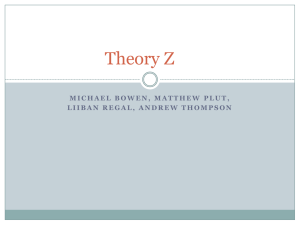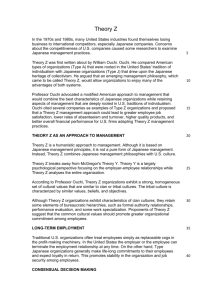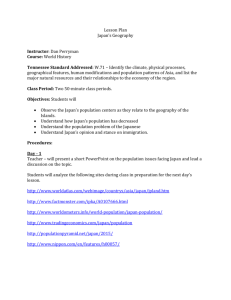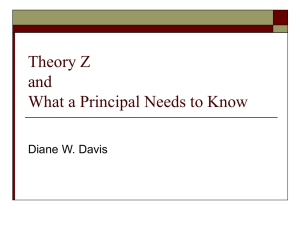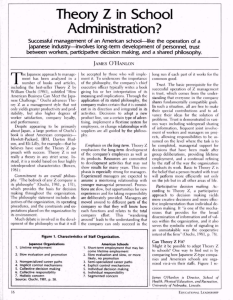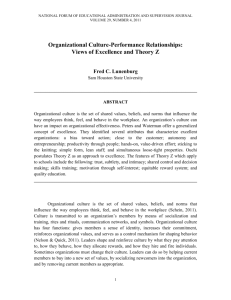Theory Z - WordPress.com
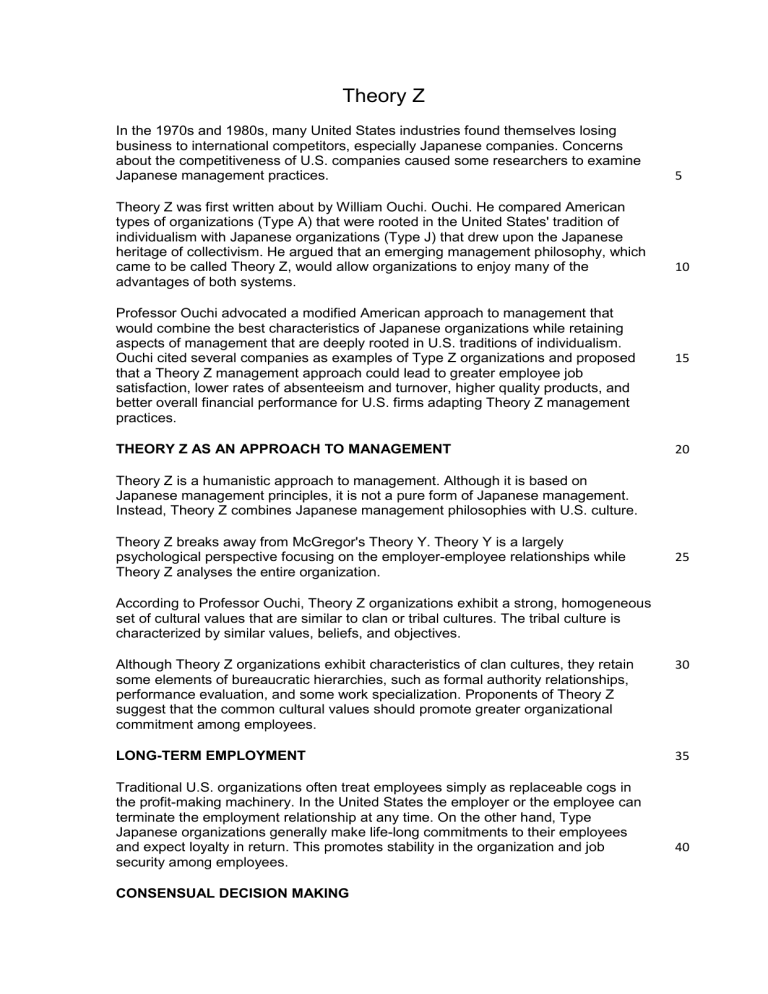
Theory Z
In the 1970s and 1980s, many United States industries found themselves losing business to international competitors, especially Japanese companies. Concerns about the competitiveness of U.S. companies caused some researchers to examine
Japanese management practices. 5
Theory Z was first written about by William Ouchi. Ouchi. He compared American types of organizations (Type A) that were rooted in the United States' tradition of individualism with Japanese organizations (Type J) that drew upon the Japanese heritage of collectivism. He argued that an emerging management philosophy, which came to be called Theory Z, would allow organizations to enjoy many of the advantages of both systems.
10
Professor Ouchi advocated a modified American approach to management that would combine the best characteristics of Japanese organizations while retaining aspects of management that are deeply rooted in U.S. traditions of individualism.
Ouchi cited several companies as examples of Type Z organizations and proposed that a Theory Z management approach could lead to greater employee job satisfaction, lower rates of absenteeism and turnover, higher quality products, and better overall financial performance for U.S. firms adapting Theory Z management practices.
THEORY Z AS AN APPROACH TO MANAGEMENT
15
20
Theory Z is a humanistic approach to management. Although it is based on
Japanese management principles, it is not a pure form of Japanese management.
Instead, Theory Z combines Japanese management philosophies with U.S. culture.
Theory Z breaks away from McGregor's Theory Y. Theory Y is a largely psychological perspective focusing on the employer-employee relationships while
Theory Z analyses the entire organization.
25
According to Professor Ouchi, Theory Z organizations exhibit a strong, homogeneous set of cultural values that are similar to clan or tribal cultures. The tribal culture is characterized by similar values, beliefs, and objectives.
Although Theory Z organizations exhibit characteristics of clan cultures, they retain some elements of bureaucratic hierarchies, such as formal authority relationships, performance evaluation, and some work specialization. Proponents of Theory Z suggest that the common cultural values should promote greater organizational commitment among employees.
LONG-TERM EMPLOYMENT
30
35
Traditional U.S. organizations often treat employees simply as replaceable cogs in the profit-making machinery. In the United States the employer or the employee can terminate the employment relationship at any time. On the other hand, Type
Japanese organizations generally make life-long commitments to their employees and expect loyalty in return. This promotes stability in the organization and job security among employees.
40
CONSENSUAL DECISION MAKING
The Type Z organization emphasizes communication, collaboration, and consensus in decision making. This marks a contrast from the traditional Type A organization that emphasizes individual decision-making.
INDIVIDUAL RESPONSIBILITY
45
Type A organizations emphasize individual accountability and performance appraisal.
Traditionally, performance measures in Type J companies are group orientated.
Thus, Type Z organizations retain the emphasis on individual contributions that are characteristic of most American firms by recognizing individual achievements, but within the context of the wider group.
50
SLOW EVALUATION AND PROMOTION
The Type A organization has generally been characterized by short-term evaluations of performance and rapid promotion of high achievers. The Type J organization, conversely, adopts the Japanese model of slow evaluation and promotion. 55
